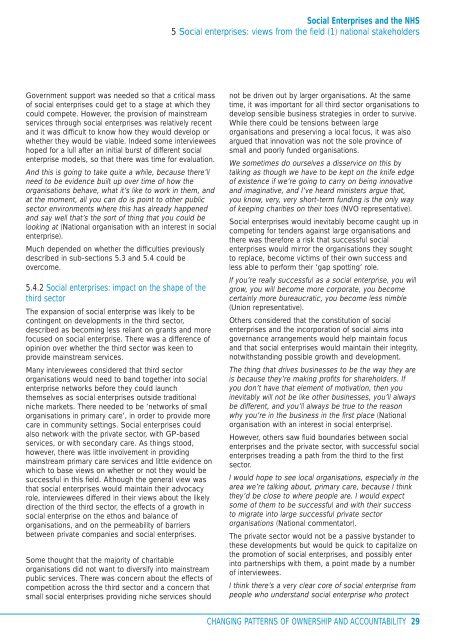Social Enterprises and the NHS - Unison
Social Enterprises and the NHS - Unison
Social Enterprises and the NHS - Unison
Create successful ePaper yourself
Turn your PDF publications into a flip-book with our unique Google optimized e-Paper software.
Government support was needed so that a critical mass<br />
of social enterprises could get to a stage at which <strong>the</strong>y<br />
could compete. However, <strong>the</strong> provision of mainstream<br />
services through social enterprises was relatively recent<br />
<strong>and</strong> it was difficult to know how <strong>the</strong>y would develop or<br />
whe<strong>the</strong>r <strong>the</strong>y would be viable. Indeed some interviewees<br />
hoped for a lull after an initial burst of different social<br />
enterprise models, so that <strong>the</strong>re was time for evaluation.<br />
And this is going to take quite a while, because <strong>the</strong>re’ll<br />
need to be evidence built up over time of how <strong>the</strong><br />
organisations behave, what it’s like to work in <strong>the</strong>m, <strong>and</strong><br />
at <strong>the</strong> moment, all you can do is point to o<strong>the</strong>r public<br />
sector environments where this has already happened<br />
<strong>and</strong> say well that’s <strong>the</strong> sort of thing that you could be<br />
looking at (National organisation with an interest in social<br />
enterprise).<br />
Much depended on whe<strong>the</strong>r <strong>the</strong> difficulties previously<br />
described in sub-sections 5.3 <strong>and</strong> 5.4 could be<br />
overcome.<br />
5.4.2 <strong>Social</strong> enterprises: impact on <strong>the</strong> shape of <strong>the</strong><br />
third sector<br />
The expansion of social enterprise was likely to be<br />
contingent on developments in <strong>the</strong> third sector,<br />
described as becoming less reliant on grants <strong>and</strong> more<br />
focused on social enterprise. There was a difference of<br />
opinion over whe<strong>the</strong>r <strong>the</strong> third sector was keen to<br />
provide mainstream services.<br />
Many interviewees considered that third sector<br />
organisations would need to b<strong>and</strong> toge<strong>the</strong>r into social<br />
enterprise networks before <strong>the</strong>y could launch<br />
<strong>the</strong>mselves as social enterprises outside traditional<br />
niche markets. There needed to be ‘networks of small<br />
organisations in primary care’, in order to provide more<br />
care in community settings. <strong>Social</strong> enterprises could<br />
also network with <strong>the</strong> private sector, with GP-based<br />
services, or with secondary care. As things stood,<br />
however, <strong>the</strong>re was little involvement in providing<br />
mainstream primary care services <strong>and</strong> little evidence on<br />
which to base views on whe<strong>the</strong>r or not <strong>the</strong>y would be<br />
successful in this field. Although <strong>the</strong> general view was<br />
that social enterprises would maintain <strong>the</strong>ir advocacy<br />
role, interviewees differed in <strong>the</strong>ir views about <strong>the</strong> likely<br />
direction of <strong>the</strong> third sector, <strong>the</strong> effects of a growth in<br />
social enterprise on <strong>the</strong> ethos <strong>and</strong> balance of<br />
organisations, <strong>and</strong> on <strong>the</strong> permeability of barriers<br />
between private companies <strong>and</strong> social enterprises.<br />
Some thought that <strong>the</strong> majority of charitable<br />
organisations did not want to diversify into mainstream<br />
public services. There was concern about <strong>the</strong> effects of<br />
competition across <strong>the</strong> third sector <strong>and</strong> a concern that<br />
small social enterprises providing niche services should<br />
<strong>Social</strong> <strong>Enterprises</strong> <strong>and</strong> <strong>the</strong> <strong>NHS</strong><br />
5 <strong>Social</strong> enterprises: views from <strong>the</strong> field (1) national stakeholders<br />
not be driven out by larger organisations. At <strong>the</strong> same<br />
time, it was important for all third sector organisations to<br />
develop sensible business strategies in order to survive.<br />
While <strong>the</strong>re could be tensions between large<br />
organisations <strong>and</strong> preserving a local focus, it was also<br />
argued that innovation was not <strong>the</strong> sole province of<br />
small <strong>and</strong> poorly funded organisations.<br />
We sometimes do ourselves a disservice on this by<br />
talking as though we have to be kept on <strong>the</strong> knife edge<br />
of existence if we’re going to carry on being innovative<br />
<strong>and</strong> imaginative, <strong>and</strong> I’ve heard ministers argue that,<br />
you know, very, very short-term funding is <strong>the</strong> only way<br />
of keeping charities on <strong>the</strong>ir toes (NVO representative).<br />
<strong>Social</strong> enterprises would inevitably become caught up in<br />
competing for tenders against large organisations <strong>and</strong><br />
<strong>the</strong>re was <strong>the</strong>refore a risk that successful social<br />
enterprises would mirror <strong>the</strong> organisations <strong>the</strong>y sought<br />
to replace, become victims of <strong>the</strong>ir own success <strong>and</strong><br />
less able to perform <strong>the</strong>ir ‘gap spotting’ role.<br />
If you’re really successful as a social enterprise, you will<br />
grow, you will become more corporate, you become<br />
certainly more bureaucratic, you become less nimble<br />
(Union representative).<br />
O<strong>the</strong>rs considered that <strong>the</strong> constitution of social<br />
enterprises <strong>and</strong> <strong>the</strong> incorporation of social aims into<br />
governance arrangements would help maintain focus<br />
<strong>and</strong> that social enterprises would maintain <strong>the</strong>ir integrity,<br />
notwithst<strong>and</strong>ing possible growth <strong>and</strong> development.<br />
The thing that drives businesses to be <strong>the</strong> way <strong>the</strong>y are<br />
is because <strong>the</strong>y’re making profits for shareholders. If<br />
you don’t have that element of motivation, <strong>the</strong>n you<br />
inevitably will not be like o<strong>the</strong>r businesses, you’ll always<br />
be different, <strong>and</strong> you’ll always be true to <strong>the</strong> reason<br />
why you’re in <strong>the</strong> business in <strong>the</strong> first place (National<br />
organisation with an interest in social enterprise).<br />
However, o<strong>the</strong>rs saw fluid boundaries between social<br />
enterprises <strong>and</strong> <strong>the</strong> private sector, with successful social<br />
enterprises treading a path from <strong>the</strong> third to <strong>the</strong> first<br />
sector.<br />
I would hope to see local organisations, especially in <strong>the</strong><br />
area we’re talking about, primary care, because I think<br />
<strong>the</strong>y’d be close to where people are. I would expect<br />
some of <strong>the</strong>m to be successful <strong>and</strong> with <strong>the</strong>ir success<br />
to migrate into large successful private sector<br />
organisations (National commentator).<br />
The private sector would not be a passive byst<strong>and</strong>er to<br />
<strong>the</strong>se developments but would be quick to capitalize on<br />
<strong>the</strong> promotion of social enterprises, <strong>and</strong> possibly enter<br />
into partnerships with <strong>the</strong>m, a point made by a number<br />
of interviewees.<br />
I think <strong>the</strong>re’s a very clear core of social enterprise from<br />
people who underst<strong>and</strong> social enterprise who protect<br />
CHANGING PATTERNS OF OWNERSHIP AND ACCOUNTABILITY 29















